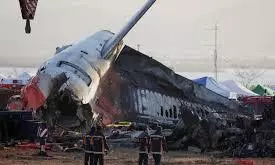
South Korea launches investigation into deadly Jeju Air crash, black box data analysed
text_fieldsSouth Korean authorities have begun analysing data retrieved from the cockpit voice recorder of a Jeju Air flight that crashed after a failed landing attempt, killing 179 of the 181 people onboard.
The Boeing 737-800, returning from Thailand, crash-landed at Muan International Airport, sparking an inferno that left only two flight attendants alive.
Deputy Minister for Civil Aviation Joo Jong-wan confirmed that initial data extraction from the cockpit voice recorder has been completed and is being converted into audio format. This will allow investigators to analyze the pilots’ final communications. Meanwhile, the severely damaged flight data recorder is being sent to the United States for analysis in collaboration with the National Transportation Safety Board (NTSB).
"The domestic extraction of data was deemed impossible due to the recorder's condition," said Joo, noting that the transfer to the U.S. might delay the investigation into South Korea’s deadliest aviation disaster.
The aircraft reportedly experienced landing gear failure during its second landing attempt. The crash occurred as the plane belly-landed, skidded along the runway, and collided with a concrete barrier before bursting into flames. The barrier supported a navigation system known as a localiser, which assists with landings.
Preliminary theories include mechanical failure or a bird strike, with investigators focusing heavily on the landing gear. A government-mandated inspection of all Boeing 737-800 models operated by South Korean carriers is underway, targeting potential vulnerabilities in landing systems.
The crash left many victims’ bodies badly burned, complicating identification efforts. By Wednesday, all 179 victims had been identified, and 43 bodies were ready for release to their families. Grieving relatives, frustrated by the slow process, gathered at the airport and the crash site, where they paid their respects with chrysanthemums and bowls of rice-cake soup.
The country’s acting president, Choi Sang-mok, emphasized the importance of a fair and objective investigation, while urging officials to expedite the return of victims’ remains to their families. Funeral arrangements are now underway as South Korea observes a seven-day mourning period.
The tragedy has cast a somber shadow over South Korea’s New Year celebrations, with many events canceled or scaled down in remembrance of the victims. Airport authorities have set up a makeshift altar for mourners, while buses have been arranged to transport grieving families to the crash site.























